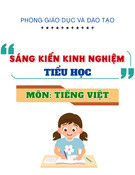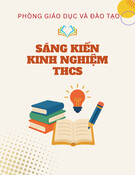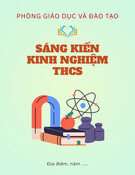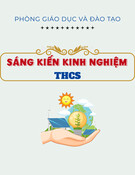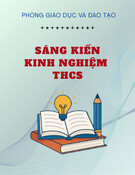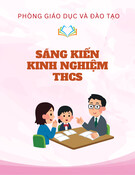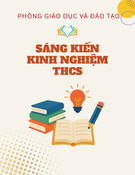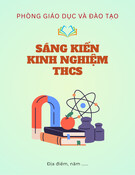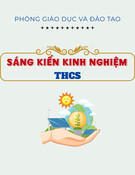
NGHE AN DEPARTMENT OF EDUCATION AND TRAINING
------
EXPERIENCE IDEA
TOPIC:
INNOVATING GROUP MEETING PROCEDURE AND
CONTENTS TO ENHANCE TEACHERS’ SPEAKING SKILL
AND ITS EFFECTIVENESS IN HOANG MAI 2 HIGH SCHOOL
Hoang Mai, April 2023

NGHE AN DEPARTMENT OF EDUCATION AND TRAINING
HOANG MAI 2 HIGH SCHOOL
------
EXPERIENCE IDEA
TOPIC:
INNOVATING GROUP MEETING PROCEDURE AND
CONTENTS TO ENHANCE TEACHERS’ SPEAKING SKILL
AND ITS EFFECTIVENESS IN HOANG MAI 2 HIGH SCHOOL
Author : Pham Thi Oanh
School : Hoang Mai 2 high school
Specialized team : English
Phone number : 0967772364
Hoang Mai, April 2023

CONTENTS
PART 1: INTRODUCTION ................................................................................... 1
1. Rationale ................................................................................................................ 1
2. Aims of the study .................................................................................................. 1
3. Research subjects .................................................................................................. 2
4. Scope of the research............................................................................................. 2
5. Research methodology .......................................................................................... 2
6. Research and experimental time ........................................................................... 2
7. Contributions of the topic ...................................................................................... 2
8. Organization of the study ...................................................................................... 3
PART II: CONTENT .............................................................................................. 4
CHAPTER 1. THEORETICAL AND PRACTICAL BASIS OF THE TOPIC 4
1. An overview of group meeting ............................................................................... 4
1.1 What is the purpose of a group meeting? ................................................................. 4
1.2 The importance of group meetings.......................................................................... 5
1.3. When do we need a group meeting? ...................................................................... 5
1. 4. How to run an effective group meeting. .......................................................... 6
2. An overview of spoken language ........................................................................ 8
2.1. The definition of spoken language ..................................................................... 8
2.2 The characteristics of spoken language .............................................................. 9
2.3 The significance of speaking skills ................................................................... 10
2.4 The functions of speaking skills ........................................................................ 11
2.5 The reality of teachers’ speaking skills. ............................................................ 11
3. Factors that affect teachers’ speaking skill..................................................... 12
3.1 Lack of environment ......................................................................................... 12
3.2 Pressure from examinations .............................................................................. 12
3.3 Lack of time for self-study and enrich their knowledge ................................... 12
4. Some current situation about group meeting of English groups at most
schools. .................................................................................................................... 12
4.1 Use Vietnamese in group meeting .................................................................... 12
4.2 Mostly do paperwork at group meeting ............................................................ 13
CHAPTER 2: SOME SOLUTIONS TO INNOVATE GROUP MEETING TO
CREATE AN ENGLISH SPEAKING ENVIRONMENT FOR ENGLISH
TEACHERS ........................................................................................................... 13
1. Use English in group meeting ............................................................................. 13
2. Use English in group chatting ............................................................................. 14
3. Innovate group meeting contents to enhance teachers’ speaking skills.............. 14
4. Use the board in the group meeting room as a tool to exchange knowledge and
learn together. .......................................................................................................... 15
5. Change place of group meeting ........................................................................... 16

6. Co-operate with other schools to exchange ideas, knowledge and learn from
each other. ............................................................................................................... 16
7. Hold annual English speaking contests for teachers. .......................................... 17
8. Make friend with native speakers and invite them to attend our group meeting or
English club so that we will have chances to practice our English and they can give
valuable ideas to contribute to our group. ............................................................... 17
CHAPTER 3: FACTORS TO BRING ABOUT A PRODUCTIVE GROUP
MEETING IN ENGLISH. .................................................................................... 19
1. The preparation. .................................................................................................. 19
2. The role of group leader. ..................................................................................... 20
3. The role of group members ................................................................................. 20
4. Stages to run a group meeting in English effectively ......................................... 20
CHAPTER 4: THE EFFECTIVENESS WHEN CARRYING OUT THIS
EXPERIENCE IDEA IN HOANG MAI 2 SCHOOL ....................................... 22
1. The effectiveness when carrying out this experience idea in Hoang Mai 2
school. ...................................................................................................................... 22
2. Teachers’ opinions about the innovation of group meeting contents and
procedure. ................................................................................................................ 22
CHAPTER 5. SURVEY ON THE URGENCY AND FEASIBILITY OF THE
EXPERIENCE IDEA. ........................................................................................... 24
1. The aim of the survey ........................................................................................ 24
2. Content and method of survey ......................................................................... 24
2.1. Survey content. ................................................................................................. 24
2.2. Survey method and Grading scale. .................................................................. 25
3. Survey scope. ...................................................................................................... 26
4. Survey result on the urgency and feasibility of suggested solutions in the
experience idea. ...................................................................................................... 26
4.1. The urgency of the research. ............................................................................ 26
4.2. The feasibility of the research. ......................................................................... 28
PART 3: CONCLUSION AND RECOMMENDATIONS ................................ 31
I. Conclusion ........................................................................................................... 31
II. Recommendations .............................................................................................. 31
REFERENCES ………………………………………………………….………
APPENDIX ……………………………………………………………………….

1
PART 1: INTRODUCTION
1. Rationale
When young teachers have just graduated from universities and gone out to
work, they usually have the habit of speaking English. Their voices are beautiful
and sweet. But at most schools English teachers are judged by the scores of their
students’ entrance exam. So they spend most of their time teaching students
grammar, reading and do multiple choice exercises. They mostly use Vietnamese
in class so day after day they gradually lose their speaking habit. But as we know,
only when the teachers have the habit of speaking English can they teach their
students to speak English well. So there is an urgent need to enhance teachers’
overall competences especially speaking skill to meet the requirement of teaching
English in this modern society.
In most of group meetings, English teachers usually speak Vietnamese and do
paperwork with very low effect and waste a lot of time. Many groups hold group
meeting just because principals require them to do so not because they have
demand to do so.
Group meeting are excellent opportunities for English teachers to enhance
their overall competences especially speaking skill to meet the new demand in this
modern society.
That is the main reason why I decided to choose the topic: “Innovating
group meeting procedure and contents to enhance teachers’speaking skill and
its effectiveness in Hoang Mai 2 high school”.
In this experience idea I address some reasons that affect teachers speaking
abilities and suggest some solutions to make full use of group meetings to enhance
teachers’ speaking skill.
2. Aims of the study
The main purpose of this experience idea is to examine and research the
factors that affect teachers’ speaking skill, the current situation of group meetings
at most of the schools. Also, it is intended to suggest some solutions to innovate
group meeting procedure and contents to enhance teachers’ speaking skill and its
effectiveness in Hoang Mai 2 high school. The study is aimed at answering 3
questions:
1, What factors affect teachers’ speaking abilities?
2, What factors affect the quality of a group meeting?
3, Which possible recommendations can be taken to innovate group meeting
procedure and contents to enhance teachers’ speaking skill and its effectiveness in
Hoang Mai 2 high school.




